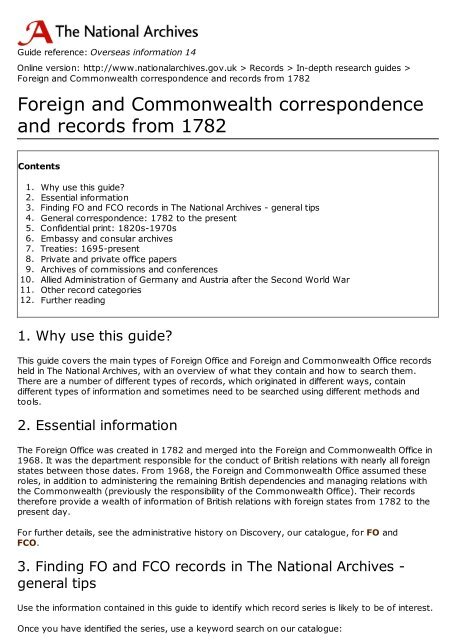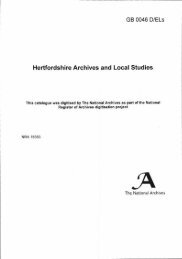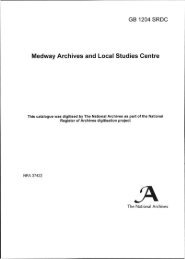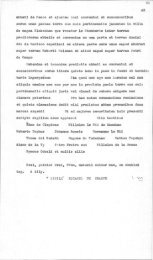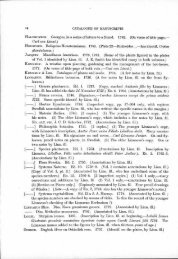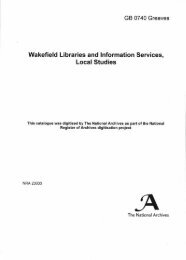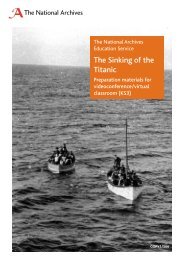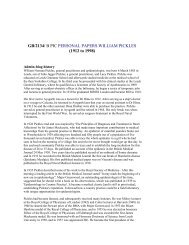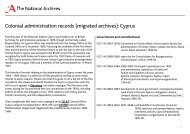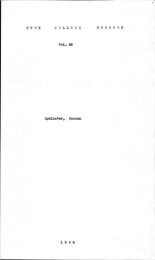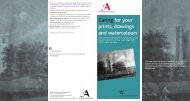Foreign and Commonwealth records from 1782 - The National ...
Foreign and Commonwealth records from 1782 - The National ...
Foreign and Commonwealth records from 1782 - The National ...
Create successful ePaper yourself
Turn your PDF publications into a flip-book with our unique Google optimized e-Paper software.
Guide reference: Overseas information 14<br />
Online version: http://www.nationalarchives.gov.uk > Records > In-depth research guides ><br />
<strong>Foreign</strong> <strong>and</strong> <strong>Commonwealth</strong> correspondence <strong>and</strong> <strong>records</strong> <strong>from</strong> <strong>1782</strong><br />
<strong>Foreign</strong> <strong>and</strong> <strong>Commonwealth</strong> correspondence<br />
<strong>and</strong> <strong>records</strong> <strong>from</strong> <strong>1782</strong><br />
Contents<br />
1. Why use this guide?<br />
2. Essential information<br />
3. Finding FO <strong>and</strong> FCO <strong>records</strong> in <strong>The</strong> <strong>National</strong> Archives - general tips<br />
4. General correspondence: <strong>1782</strong> to the present<br />
5. Confidential print: 1820s-1970s<br />
6. Embassy <strong>and</strong> consular archives<br />
7. Treaties: 1695-present<br />
8. Private <strong>and</strong> private office papers<br />
9. Archives of commissions <strong>and</strong> conferences<br />
10. Allied Administration of Germany <strong>and</strong> Austria after the Second World War<br />
11. Other record categories<br />
12. Further reading<br />
1. Why use this guide?<br />
This guide covers the main types of <strong>Foreign</strong> Office <strong>and</strong> <strong>Foreign</strong> <strong>and</strong> <strong>Commonwealth</strong> Office <strong>records</strong><br />
held in <strong>The</strong> <strong>National</strong> Archives, with an overview of what they contain <strong>and</strong> how to search them.<br />
<strong>The</strong>re are a number of different types of <strong>records</strong>, which originated in different ways, contain<br />
different types of information <strong>and</strong> sometimes need to be searched using different methods <strong>and</strong><br />
tools.<br />
2. Essential information<br />
<strong>The</strong> <strong>Foreign</strong> Office was created in <strong>1782</strong> <strong>and</strong> merged into the <strong>Foreign</strong> <strong>and</strong> <strong>Commonwealth</strong> Office in<br />
1968. It was the department responsible for the conduct of British relations with nearly all foreign<br />
states between those dates. From 1968, the <strong>Foreign</strong> <strong>and</strong> <strong>Commonwealth</strong> Office assumed these<br />
roles, in addition to administering the remaining British dependencies <strong>and</strong> managing relations with<br />
the <strong>Commonwealth</strong> (previously the responsibility of the <strong>Commonwealth</strong> Office). <strong>The</strong>ir <strong>records</strong><br />
therefore provide a wealth of information of British relations with foreign states <strong>from</strong> <strong>1782</strong> to the<br />
present day.<br />
For further details, see the administrative history on Discovery, our catalogue, for FO <strong>and</strong><br />
FCO.<br />
3. Finding FO <strong>and</strong> FCO <strong>records</strong> in <strong>The</strong> <strong>National</strong> Archives -<br />
general tips<br />
Use the information contained in this guide to identify which record series is likely to be of interest.<br />
Once you have identified the series, use a keyword search on our catalogue:
Enter your keyword (such as a country or person) <strong>and</strong> your chosen record series code<br />
You can further restrict your search by date<br />
Some record series have indexes <strong>and</strong> registers which may be more effective than a<br />
keyword search – see below for more information<br />
Please note that a number of the <strong>records</strong> described below have either been reproduced in published<br />
volumes, or more recently in commercial licensed digitisations (see Further reading). <strong>The</strong>se may<br />
provide an easier method of accessing the <strong>records</strong> than consulting the original documents.<br />
4. General correspondence: <strong>1782</strong> to the present<br />
4.1 Searching general correspondence<br />
<strong>The</strong> general correspondence consists of the original papers accumulated in London:<br />
original despatches <strong>from</strong> British representatives abroad with any enclosures<br />
drafts of outgoing despatches; minutes<br />
domestic correspondence with foreign representatives in this country, with other branches of<br />
the British government <strong>and</strong> with private individuals <strong>and</strong> bodies.<br />
General correspondence covers a large number of record series. Until 1938 their catalogue<br />
descriptions are usually very basic, often giving nothing more than the surname of the relevant<br />
diplomatic representative (to 1905) or the name of the country (<strong>from</strong> 1906), but there are<br />
registers <strong>and</strong> indexes that can help.<br />
4.2 General correspondence <strong>1782</strong>-1905<br />
Records before 1906 are in the series FO 1 to FO 82 <strong>and</strong> FO 99 to FO 110. For the most part,<br />
they are arranged by country. <strong>The</strong>re are also some series of a general or miscellaneous nature not<br />
related to a particular country: FO 83 (General correspondence, Great Britain <strong>and</strong> other); FO<br />
84 (Slave Trade department correspondence); FO 95 <strong>and</strong> FO 96 (Miscellanea); <strong>and</strong> FO 97<br />
(supplements to general correspondence).<br />
To locate <strong>records</strong> within general correspondence <strong>1782</strong>-1905, search our catalogue, or browse our<br />
catalogue <strong>from</strong> FO. For further details on the contents of each <strong>records</strong> series refer to the following<br />
registers <strong>and</strong> indexes:<br />
To 1891: Library series registers <strong>and</strong> indexes (FO 605). <strong>The</strong>se are the best registers <strong>and</strong><br />
indexes to access the major record series up to 1891. Registers <strong>and</strong> indexes arranged by<br />
country; consist of subject indexes which refer to registers which then refer to the <strong>records</strong> in<br />
FO 1 to FO 90 <strong>and</strong> FO 95 to FO 105<br />
1891-1905: Indexes to departmental registers (FO 804). Arranged by country or subject;<br />
coverage is good but not comprehensive. Photocopies of selected volumes are in <strong>The</strong><br />
<strong>National</strong> Archives' reading rooms (FO 738); they must be cross-referenced with<br />
departmental registers (see below)<br />
Departmental registers (FO 566). Registers of correspondence by department. Useful for an<br />
overview of correspondence up to 1890. 1891-1905 these are main form of reference, in<br />
conjunction with the indexes to departmental registers<br />
Note that reference conversions <strong>from</strong> old <strong>Foreign</strong> Office to current <strong>National</strong> Archives<br />
references will be necessary<br />
4.3 General correspondence 1906-1966<br />
From 1906 the general correspondence covering for all countries is arranged in a small number of<br />
subject series. Of these, the political correspondence (FO 371) is by far the largest <strong>and</strong> generally<br />
most important.
Description Catalogue reference<br />
Political correspondence FO 371<br />
Africa correspondence to 1913 (<strong>from</strong> 1914 see FO 371) FO 367<br />
Commercial <strong>and</strong> sanitary correspondence to 1920 FO 368<br />
Consular correspondence FO 369<br />
Treaty <strong>and</strong> protocol correspondence FO 372<br />
Wartime departments (First World War) FO 382, FO 383<br />
News, library, information, communications, cultural<br />
relations, publicity<br />
Claims correspondence <strong>from</strong> 1946 FO 950<br />
To locate <strong>records</strong> within general correspondence 1906-1966:<br />
1906-1920: Online catalogue descriptions are very basic, usually containing only a country's<br />
name; for search tips see section 2 above. For detailed searching refer to the following registers<br />
<strong>and</strong> indexes:<br />
Card index to correspondence 1906-1920 (FO 1111). Comprehensive card index to<br />
correspondence by name, subject <strong>and</strong> place. Located in the reading room at <strong>The</strong> <strong>National</strong><br />
Archives. From 1906 to 1909 must be used in conjunction with departmental registers<br />
Departmental registers (FO 566). Registers of correspondence by department. Useful for an<br />
overview of correspondence<br />
1920-1966: Online catalogue descriptions are very basic until 1939, <strong>and</strong> generally give only<br />
moderate detail thereafter; for search tips see section 2 above. For more detailed searching refer<br />
to the following indexes:<br />
Index to volumes of correspondence 1920-1953, 1959 (FO 409). Comprehensive index<br />
volumes to correspondence by name, subject <strong>and</strong> place. 1920-1951 volumes have been<br />
published: Index to <strong>Foreign</strong> Office Correspondence (Kraus-Thomson 1969-82, 131 volumes)<br />
<strong>The</strong> <strong>National</strong> Archives does not have any registers or indexes for 1954-1958 or <strong>from</strong> 1960<br />
onwards. Researchers interested in these period should identify record series using this guide<br />
<strong>and</strong> then use a keyword search (detailed above)<br />
In the 20th century, <strong>and</strong> particularly after 1914, these registers <strong>and</strong> indexes often provide<br />
references to <strong>records</strong> since destroyed.<br />
Note that reference conversions <strong>from</strong> old <strong>Foreign</strong> Office to current <strong>National</strong> Archives' references<br />
will be necessary.<br />
4.4 General correspondence after 1966<br />
In 1967 the registries of the <strong>Commonwealth</strong> Office <strong>and</strong> the <strong>Foreign</strong> Office were merged, more than<br />
one year before they themselves were combined as the <strong>Foreign</strong> <strong>and</strong> <strong>Commonwealth</strong> Office. From<br />
this point, the <strong>records</strong> are arranged in regional geographical groups or subject groups reflecting<br />
their departmental organisation.<br />
<strong>The</strong> geographical general correspondence series are:<br />
FO 395 , FO 370, FO<br />
627, FO 850, FO 924,<br />
FO 953
Region Series<br />
Europe FCO 9 (Southern Europe), FCO 28 (Eastern Europe <strong>and</strong> USSR),<br />
FCO 33 (Western Europe), FCO 87 (Republic of Irel<strong>and</strong> <strong>from</strong><br />
<strong>The</strong> Americas <strong>and</strong><br />
Atlantic<br />
1972)<br />
FCO 7 (America <strong>and</strong> Latin America), FCO 42 (Gibraltar <strong>and</strong><br />
South Atlantic to 1971), FCO 44 (West Indies to 1972, West<br />
Indies <strong>and</strong> Atlantic <strong>from</strong> 1972), FCO 63 (North America <strong>and</strong><br />
Caribbean to 1969, Caribbean <strong>from</strong> 1969), FCO 82 (North<br />
America <strong>from</strong> 1971), FCO 83 (Atlantic <strong>and</strong> Indian Ocean 1971-<br />
72), FCO 86 (Gibraltar <strong>from</strong> 1972), FCO 99 (Mexico <strong>and</strong><br />
Caribbean <strong>from</strong> 1977)<br />
Africa FCO 29 (Central Africa 1968-69), FCO 31 (East Africa), FCO<br />
36 (Rhodesia), FCO 39 (North Africa to 1972, Near East <strong>and</strong><br />
North Africa 1972 only), FCO 45 (Southern Africa to 1969,<br />
Central <strong>and</strong> Southern Africa <strong>from</strong> 1969), FCO 65 (West Africa),<br />
FCO 93 (Near East <strong>and</strong> North Africa <strong>from</strong> 1972)<br />
Middle East FCO 8 (Arabia to 1972, Middle East <strong>from</strong> 1972), FCO 17 (Near<br />
East to 1972, Near East <strong>and</strong> North Africa 1972-73), FCO 39<br />
(Near East <strong>and</strong> North Africa 1972 only), FCO 93 (Near East<br />
<strong>and</strong> North Africa <strong>from</strong> 1972)<br />
South Asia <strong>and</strong> Indian FCO 32 (Pacific <strong>and</strong> Indian Ocean to 1971), FCO 37 (South<br />
Ocean<br />
Asia), FCO 40 (Hong Kong <strong>and</strong> Indian Ocean <strong>from</strong> 1972), FCO<br />
83 (Atlantic <strong>and</strong> Indian Ocean 1971-72)<br />
Far East, South East FCO 15 (South East Asia), FCO 21 (Far East), FCO 24 (South<br />
Asia <strong>and</strong> Pacific West Pacific), FCO 32 (Pacific <strong>and</strong> Indian Ocean to 1971,<br />
Pacific Dependent Territories <strong>from</strong> 1972), FCO 40 (Hong Kong<br />
to 1972, Hong Kong <strong>and</strong> Indian Ocean <strong>from</strong> 1972)<br />
<strong>The</strong> subject general correspondence series are in:<br />
Subjects Series<br />
Economic, Transport <strong>and</strong><br />
Communications<br />
Departments<br />
Defence <strong>and</strong> Disarmament<br />
Departments<br />
Cultural, Development <strong>and</strong><br />
Scientific Departments<br />
5. Confidential print: 1820s-1970s<br />
FCO 14, FCO 30, FCO 35, FCO 59, FCO 67, FCO 69,<br />
FCO 70, FCO 71, FCO 74, FCO 76, FCO 96, FCO 98<br />
FCO 10, FCO 16, FCO 41, FCO 46, FCO 66<br />
FCO 13, FCO 34, FCO 48, FCO 55<br />
Consular, Migration, Treaty, FCO 47, FCO 50, FCO 53, FCO 57, FCO 64<br />
Protocol <strong>and</strong> Claims<br />
Departments<br />
United Nations FCO 58, FCO 61<br />
Administrative, Information,<br />
Research <strong>and</strong> Central Policy<br />
Departments<br />
1977 Conferences (EEC,<br />
NATO, <strong>Commonwealth</strong>)<br />
FCO 12, FCO 26, FCO 49, FCO 51, FCO 52, FCO 56,<br />
FCO 68, FCO 72, FCO 86, FCO 95<br />
FCO 104<br />
From the late 1820s, correspondence of particular significance began to be printed in several<br />
copies <strong>and</strong> distributed to officials in the <strong>Foreign</strong> Office, to the Cabinet, to other departments <strong>and</strong> to<br />
British missions abroad. <strong>The</strong>se copies were known as confidential print.<br />
By 1906 nearly every important despatch or telegram was printed routinely. <strong>The</strong>se documents are<br />
a good way to gain a summary overview of <strong>Foreign</strong> Office political correspondence before<br />
accessing the extensive holdings in the main general correspondence series described above.<br />
Confidential prints vary <strong>from</strong> a single document to a substantial volume of papers, <strong>and</strong> are<br />
numbered individually, roughly in order of printing. For further information, <strong>and</strong> to see lists of
confidential prints on particular regions <strong>and</strong> subjects, please go the FO series division within our<br />
catalogue.<br />
Confidential prints ceased to be produced in the 1970s with the arrival of photocopying.<br />
6. Embassy <strong>and</strong> consular archives<br />
<strong>The</strong>se consist of the original despatches received <strong>from</strong> the <strong>Foreign</strong> Office by British diplomatic <strong>and</strong><br />
consular posts abroad, draft despatches to London, local correspondence with the government <strong>and</strong><br />
other authorities of the foreign state, with other British representatives <strong>and</strong> agents <strong>and</strong> private<br />
individuals. <strong>The</strong>se <strong>records</strong> often include other local <strong>records</strong> such as registers of births, deaths <strong>and</strong><br />
marriages of British subjects abroad, consular court <strong>records</strong>, commercial <strong>records</strong> of many sorts,<br />
papers about British churches <strong>and</strong> cemeteries <strong>and</strong> the estates of British subjects.<br />
From the 1820s, registers exist for some of these series. Please note that not all embassy <strong>and</strong><br />
consular <strong>records</strong> have survived.<br />
How to search:<br />
Search our catalogue using as key words country names, <strong>and</strong> terms such as ‘Embassy’,<br />
‘Consular’ <strong>and</strong> ‘Archives’; refine by FO <strong>and</strong> FCO<br />
Or go to the Series Division ‘Records of Embassies, Legations, Consulates, etc’ within<br />
FO for a full list<br />
7. Treaties: 1695-present<br />
<strong>The</strong>re are different types of treaty <strong>records</strong>, made at different stages of the treaty process, <strong>and</strong><br />
these are held in different record series:<br />
Before a treaty is made, the parties exchange the Full Powers or authorisations granted to<br />
their plenipotentiaries.<br />
<strong>The</strong> document reciting the agreed terms of the treaty, signed <strong>and</strong> sealed by the<br />
plenipotentiaries of each side is the Protocol.<br />
Following the signing <strong>and</strong> sealing of the Protocol, ratifications were drawn up, <strong>and</strong> signed <strong>and</strong><br />
sealed by the head of state of each party <strong>and</strong> exchanged, or sometimes deposited in an<br />
agreed place if there were several parties.<br />
Subjects Dates Series<br />
Treaty Protocols (with Full Powers of other parties, <strong>and</strong><br />
subsidiary documents, mostly 1775 to 2001)<br />
1695-2003 FO 93<br />
Ratifications of treaties (mostly up to 2001) <strong>1782</strong>-2005 FO 94<br />
Full powers of British plenipotentiaries <strong>and</strong> entries or<br />
drafts of ratifications<br />
1813-1967 Pieces<br />
within FO<br />
83<br />
Protocols <strong>and</strong> ratifications of multilateral treaties (mostly 1907-2002 FO 949<br />
<strong>from</strong> 1969)<br />
Protocols <strong>and</strong> ratifications of EEC treaties (mostly <strong>from</strong><br />
1973)<br />
Draft full powers <strong>and</strong> draft ratification instruments 1968<br />
onwards<br />
1953-1997 FO 974<br />
FCO 3
Protocols <strong>and</strong> Ratifications of Treaties (mostly <strong>from</strong><br />
2001)<br />
8. Private <strong>and</strong> private office papers<br />
1962<br />
onwards<br />
Private <strong>and</strong> private office papers relating to foreign affairs held at <strong>The</strong> <strong>National</strong> Archives fall under<br />
three main categories:<br />
9. Archives of commissions <strong>and</strong> conferences<br />
FCO 85<br />
Categories Series<br />
Private papers of diplomats <strong>and</strong> politicians involved in<br />
foreign affairs directly gifted to, or deposited with, the<br />
Public Record Office (later the <strong>National</strong> Archives)<br />
Unregistered papers of mostly (though not entirely)<br />
19th century politicians, diplomats <strong>and</strong> officials taken<br />
away on retirement but subsequently returned to<br />
government. Anthony Eden’s papers (FO 954) are<br />
available online<br />
Private office papers of mostly 20th century politicians,<br />
diplomats <strong>and</strong> officials surrendered to government on<br />
retirement<br />
Private papers are found<br />
in PRO 30/1-99. You can<br />
also search the <strong>National</strong><br />
Register of Archives by<br />
name/place<br />
name/subject.<br />
Search our catalogue by<br />
surname, restricting by<br />
year range <strong>and</strong> by<br />
department code FO<br />
Search our catalogue by<br />
surname <strong>and</strong> record series<br />
FO 800 <strong>and</strong> FO 73.<br />
RA Butler’s private office<br />
papers are in FO 1109.<br />
Also a small selection of<br />
papers (1904-1942) in FO<br />
794<br />
<strong>The</strong> <strong>Foreign</strong> Office <strong>records</strong> contain the archives of a large number of bilateral or multilateral<br />
international commissions, <strong>from</strong> 1790-1967. Subjects range <strong>from</strong> the slave trade to American<br />
fisheries. Search by keyword within FO to find more information.<br />
<strong>The</strong> <strong>records</strong> of British delegations to international conferences <strong>from</strong> 1814-1976 can be found in<br />
FO <strong>and</strong> CAB (<strong>records</strong> of the Cabinet Office). See our catalogue series divisions for FO <strong>and</strong> CAB for<br />
further details.<br />
10. Allied Administration of Germany <strong>and</strong> Austria after the<br />
Second World War<br />
<strong>The</strong> <strong>Foreign</strong> Office inherited the <strong>records</strong> of a number of the organisations through which the Allies<br />
administered what are now Germany <strong>and</strong> Austria after the Second World War. Researchers should<br />
note the distinctions between the Control Offices, which were based in London, the Control<br />
Commissions, which were based in Germany <strong>and</strong> Austria, <strong>and</strong> the Civil High Commission, which<br />
instigated de facto self-government in West Germany <strong>from</strong> 1948 until 1955 (when normal<br />
diplomatic relations were resumed).<br />
A catalogue of most of these <strong>records</strong>, produced in German <strong>and</strong> English, was published in the<br />
1990s. Researchers are advised to consult it: Akten der britischen Militärregierung in Deutschl<strong>and</strong>:<br />
Sachinventar 1945-1955 (11 Volumes, Published by KG Saur 1993).<br />
For a breakdown of the <strong>records</strong> relating to the Allied Administration, please see the Series<br />
Division within FO<br />
If you are interested in a particular subject, you could also use a key word search on our<br />
catalogue. For example, search for the word or phrase ‘Censorship AND Control Commission
for Germany’, year range 1945 to 1950, within series FO<br />
<strong>The</strong> <strong>records</strong> of the Allied Komm<strong>and</strong>atura, the four power body that administered Berlin until<br />
the end of the Cold War, are in FO 1112<br />
11. Other record categories<br />
Please see below for other relevant series:<br />
Categories Series<br />
Chief Clerk’s<br />
Department<br />
PRO 57/2805<br />
Wartime departments<br />
<strong>and</strong> missions (First<br />
World War)<br />
Wartime departments<br />
<strong>and</strong> missions (Second<br />
World War)<br />
12. Further reading<br />
Some or all of the publications below may be available to buy <strong>from</strong> <strong>The</strong> <strong>National</strong> Archives'<br />
bookshop. Alternatively, search <strong>The</strong> <strong>National</strong> Archives' library catalogue to see what is<br />
available to consult at Kew.<br />
Published copies of <strong>records</strong>:<br />
British Documents on the Origins of the War, Documents on British <strong>Foreign</strong> Policy, Documents on<br />
British Policy Overseas (13, 68 <strong>and</strong> 18 Volumes respectively, HMSO <strong>and</strong> Routledge, 1926<br />
onwards). Selections of documents (mostly general correspondence) covering the build up to the<br />
First <strong>and</strong> Second World Wars <strong>and</strong> the Cold War respectively.<br />
British Documents on <strong>Foreign</strong> Affairs (over 200 volumes, University Publications of America, 1983<br />
onwards). Selection of Confidential Prints <strong>from</strong> mid-19th to mid-20th century.<br />
British <strong>and</strong> <strong>Foreign</strong> State Papers (168 Volumes, HMSO 19th c. to 1977). Published copies of major<br />
treaties <strong>from</strong> 1812 to 1967.<br />
Secondary material:<br />
Michael Roper, <strong>The</strong> Records of the <strong>Foreign</strong> Office, <strong>1782</strong>-1968 (Public Record Office, 2002)<br />
Louise Atherton, Never Complain, Never Explain: Records of the <strong>Foreign</strong> Office <strong>and</strong> the State Paper<br />
Office 1500-c.1960 (Public Record Office, 1994), includes well-explained guidance on how to use<br />
the registers <strong>and</strong> indexes to <strong>Foreign</strong> Office correspondence.<br />
Guide reference: Overseas information 14<br />
Downloaded <strong>from</strong>:<br />
See Series Division<br />
FO 660 (Ministers Resident), FO 837 <strong>and</strong> FO 935 (Ministry of<br />
Economic Warfare), FO 892 (French <strong>National</strong> Committee), FO<br />
898 (Political Warfare Executive), FO 916 (Consular (War)),<br />
FO 921 (Minister of State, Cairo), FO 957 (British Middle<br />
East Office, Cairo)<br />
Passport Office See Series Division; also FO 971 (special files)<br />
Permanent<br />
Undersecretary of<br />
State’s Department<br />
FO 1093 (unregistered papers covering intelligence matters;<br />
includes papers on Rudolf Hess <strong>and</strong> on the Duke of Windsor)
http://www.nationalarchives.gov.uk/<strong>records</strong>/research-guides/fo-fco-<strong>from</strong>-<strong>1782</strong>.htm


